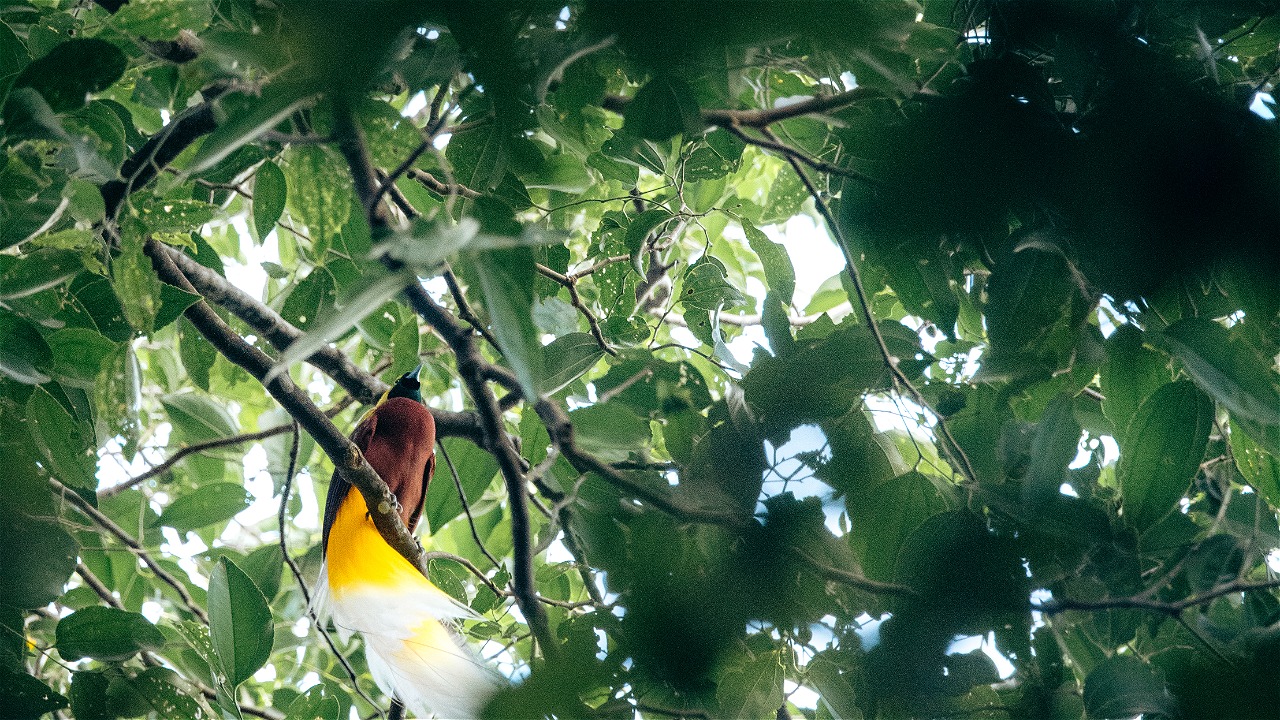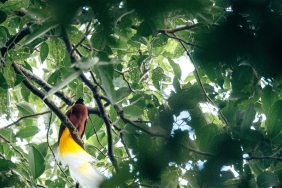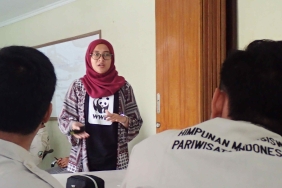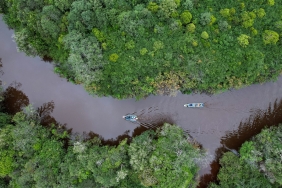ALEX WAISIMON, THE GUARDIAN OF BIRDS OF PARADISE
By: Natalia Trita Agnika
Today, November 10, is the anniversary of Heroes Day. A hero is a person who dares to fight selflessly, fighting for something that is not in their own interest. Those who are willing to sacrifice their comfort zone, fight for the interests of the community, and make sacrifices for the preservation of the environment are also heroes. Alex Waisimon, the guardian of paradise is one of them.
Alex Waisimon, a simple man who lives modestly on the edge of the forest in Nimbokrang District, has not had a simple adventure. Starting from studying at Satya Wacana Christian University, Salatiga until the 4th semester, Mr. Alex then joined Red Cross Asia Pacific and began to step outside the archipelago. His sense of helping and adventure also led him to join the International Labor Organizations (ILO) which took him around the world fighting for the fate of fellow workers in several parts of the world, such as labor demonstrations in Korea. His feet went as far as Costa Rica, Latin America, the Caribbean, France, the Netherlands, Suriname, Thailand, Malaysia, Vietnam, Cambodia, India, Laos, Burma, Fiji, Vanuatu, Australia and China.
Mr. Alex is also a simple man with many talents. His cooking skills made him a chef at an Italian Restaurant in Hamburg, Germany, until finally in 2007, Mr. Alex decided to return to Indonesia, specifically to Bali where his English skills were used to become a tour guide. In 2014, Mr. Alex declared that he wanted to develop his homeland, Papua. He was willing to leave all the comforts he had acquired. He left his wife and four children in Bali because they were still in school. "I went everywhere, but never found a place as beautiful as my birthplace. I wake up in the morning to the sound of birds. Early in the morning birds praise the Almighty with their beautiful voices. I can't find a clear river in other people's countries," he said, revealing his reasons for returning to his homeland.
Keeping the Cendrawasih
During his eight months in his homeland, Pak Alex was able to recognize different types of birds and their sounds. He learned the traits of the birds, especially the Twelve Wired Bird of Paradise (dead-wire bird of paradise/ Seleucidis melanoleucus -Red) and Lesser Bird of Paradise (small yellow bird of paradise/ Paradisaea minor -Red). Both are part of the Bird of Paradise family which is the pride of Papua.
In the forest, Mr. Alex built a non-permanent monitoring hut that blends in with nature. At first glance, the hut looks like part of the forest so that bird lovers can observe the behavior of birds of paradise without disturbing them. Most bird lovers who come to observe birds of paradise are not from Indonesia. Mr. Alex knows the names of the birds in the forest by heart. But he always apologizes for only knowing the names in English.
Nimbokrang District, Jayapura Regency, where Pak Alex lives, is known as a bird watching spot. Uniquely, bird lovers who want to meet Mr. Alex only need to send a short message and Mr. Alex will be ready as a guide. When asked what if the person who sent the text message doesn't come, he replied, ""It's okay, I'm ready because I'm always here"". People looking for Mr. Alex get his name and phone number from fellow birdwatchers. Many of them are professional photographers from international media, such as National Geographic and the BBC.
Enjoying the birds of paradise does come at a special time. For example, the Twelve Wired Bird of Paradise is only visible until around 6.30am. Some birds are only present in the morning until 9:00 a.m. WIT and some are visible in the afternoon. The most pleasant time to see the birds is after the rain. Although the terrain becomes relatively harder, the sightings will be worth the struggle. The birds of paradise are happiest dancing and playing together among the tallest leaves.
One of the biggest threats to the loss of forest resources and genetic richness (endemic flora and fauna) that still remain in the "Tabo Kutumai" customary forest is that some areas have been released for palm oil investment and land conversion. For this reason, Pak Alex invites the surrounding community to fight for these birds of paradise by defending and protecting the forest from being converted. One way is to develop the potential for ecotourism through "bird watching" activities that can provide economic value while maintaining the sustainability of birds of paradise and their nature.
Full Support for Conservation Efforts
In just 1.5 years, the results are already visible. Initially people could only see 1-2 birds. Now they can see at least 5-6 birds and the volume of bird sounds has also increased dramatically. He has also prepared locations where simple buildings will be built to "school" birds and to rest after observation. The simple building will blend in with nature (of course without electricity and modern structures) and be equipped with local Papuan food that is definitely organic.
Not only developing the ecotourism potential of bird watching in his homeland, Mr. Alex is also fighting for the preservation of the nature where he lives. The Isyo Hiil's location currently developed by Mr. Alex is owned by 1 clan/tang, namely Waisimon. Mr. Alex has worked with WWF-Indonesia and handed over 19,000 hectares of his clan's land for conservation purposes. During the filming of Kick Andy on Location in Nimbokrang, Jayapura some time ago, Mr. Alex gathered other tribal chiefs and invited them to surrender their land for conservation purposes. The total area of the land is 98,000 hectares. All nine chiefs, including Mr. Alex, signed a document stating their hope and commitment to give up 98,000 hectares of land for conservation purposes. The document was then handed over to Andy Noya, host of Kick Andy, to be delivered to the Minister of Forestry and Environment of the Republic of Indonesia.
Not only does Mr. Alex care about nature conservation, he also cares deeply about the cultural heritage of his ancestors in his homeland. The cultural and linguistic differences of each tribe in Papua are numerous and Mr. Alex really appreciates this as an extraordinary heritage treasure. The uniqueness of Papuan culture is that its stories are passed down orally from ancestors to the next generation. Therefore, Mr. Alex aspires to collect various stories, tales, and stories so that there is a written legacy for future generations. Although he has traveled extensively to various countries, his love for Papua is extraordinary. His efforts to preserve nature are in line with cultural heritage, "If there is no culture, there is no history, there will be no nation. If there are no birds, no one will visit Nimbokrang," he said.





